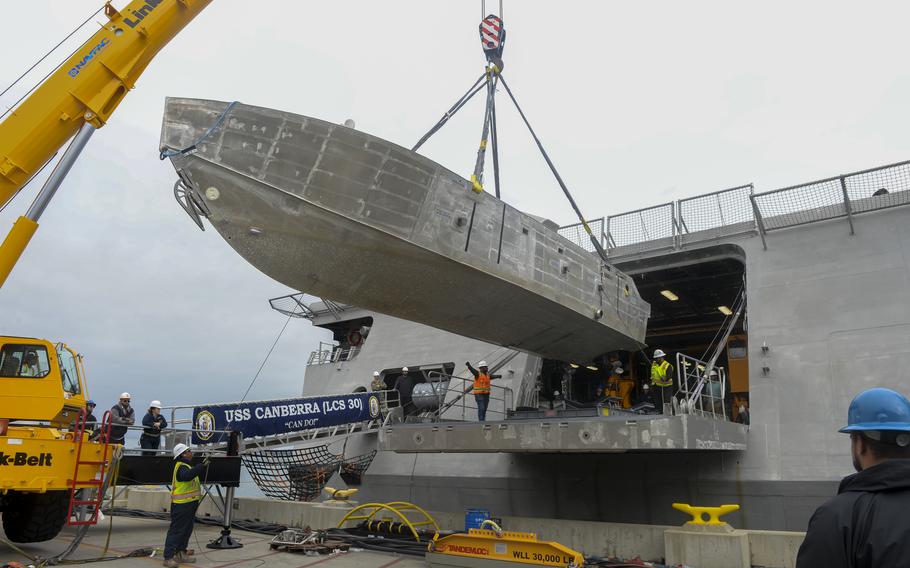
An unmanned surface vehicle is loaded onto the littoral combat ship USS Canberra on April 23, 2024, at Naval Base San Diego, Calif., as part of the first embarkation of the mine countermeasures mission package. The Navy plans to deploy littoral combat ships to the Middle East for mine countermeasure operations. (Vance Hand/U.S. Navy)
MANAMA, Bahrain — The Navy is on track to homeport four Independence-class littoral combat ships in Bahrain next year as part of a new mine countermeasures force in the Middle East, service officials said.
The first three ships will be USS Canberra, USS Tulsa and USS Santa Barbara, all based out of San Diego. The fourth is not yet identified, Capt. Nathan Wemett, commander of Naval Surface Group Central, said Friday.
The Navy has been required to wait on retiring its Bahrain-based Avenger-class ships, which were built in the 1980s and 1990s to counter mines, until the long-delayed introduction of a minehunting module for the littoral ships.
In April, USS Canberra became the inaugural LCS equipped with a mine countermeasures mission package, setting the stage for the ship’s deployment in 2025.
The upgrade featured the integration of sensors, software and unmanned vehicles, while the ship’s crew trained on using the module.
The Navy plans for 15 Independence-class ships in its global fleet to conduct the mine countermeasures mission, Rear Adm. Fred Pyle, the director of surface warfare on the chief of naval operations’ staff, said in a statement.
Deployment of ships with the mine countermeasure mission package will enhance the flexibility of the service’s expeditionary forces, Navy officials have said.
The pier construction on Naval Support Activity Bahrain, which lasted over three years, was necessary to support the ships with power, water, sewage and internet connections.
“We have taken the lessons learned from deploying the ships to Singapore, as well as USS Sioux City and Indianapolis over the last two years, to best posture our waterfront to support the LCS,” Wemett said.
The vessels have been envisioned to serve as “motherships” for drones that would operate in the U.S. Central Command area of responsibility. The LCS can accommodate surface and underwater drones, as well as the Firescout unmanned helicopter.
Drone boats have been used as part of increased patrols by the Navy in the Strait of Hormuz since last summer, when tensions between the U.S. and Iran flared over accusations that Tehran was harassing civilian shipping.
Putting the littoral vessels in place is a top priority because of the need to safeguard sea lanes, said Brig. Gen. Marcus Annibale, director of expeditionary warfare and resource sponsor for mine warfare.
“We don’t want to put the man in the minefield, we want to put the sensor in the minefield,” Annibale said at the Surface Navy Association’s Annual Symposium in 2023, when the possibility of sending littoral vessels to Bahrain was mentioned, Seapower Magazine reported at the time.
Mine countermeasures were planned to be part of the LCS ever since the first ships went into production in the 2000s. But the original Remote Minehunting System, which was supposed to be operating by 2015, failed reliability tests.
The revamped mine countermeasures module reached initial operating capability after testing aboard the Independence-class USS Cincinnati, the Navy announced last year.